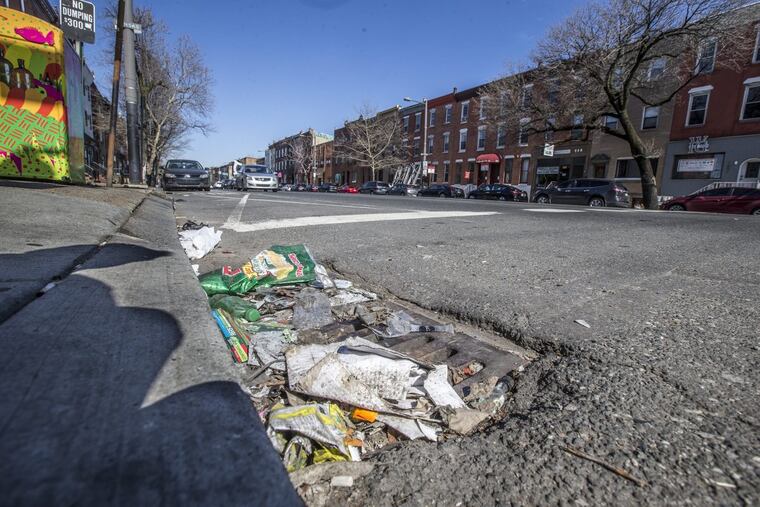Bring street sweeping back to Philly's neighborhoods | Opinion
Our dirty streets are not just due to litter, but all the road silt and half-decomposed leaves that are beyond what should be expected of our citizens to clean.

As the calendar moves toward spring, many Philadelphians come out to clean their streets and neighborhoods. Since visitors to Philly often mention how dirty our city is, it is easy to assume we don't care. The truth is that many citizens are doing their part to clean up Philly, but the city is not meeting its end of the bargain. While litter may be caused by some of our residents, it must be a city-driven solution — one that receives the necessary political and financial support from our leaders.
Since launching Not in Philly in 2016, I have seen the efforts of our people firsthand. Members of Not in Philly pick up the litter on their streets, once a week, on their own schedule. To coordinate those efforts, Notinphilly.org is the first website in the country to break up a city into selectable block segments that can be targeted for litter removal.
Philadelphians have more than stepped up: In our first year, more than 1,000 residents claimed a block to clean. We supply our University City members with grabbers and bags, and will provide resources to any neighborhood where we can secure funding and local partnerships. New Philadelphians and longtime residents hate litter equally, but we often feel powerless over it. Our participants can see on our map how their efforts are not in vain, knowing others are also cleaning up.
With the promise in the 2015 election that combating litter would be a high priority, we expected that our efforts on the ground would coincide with those of the city government. We support the plans laid out by the mayor's anti-litter cabinet but believe the time has come for bold action. The city's failure to aggressively tackle this pervasive problem is a clear message that the status quo is acceptable.
If city leadership wants to show it is serious about cleaning up our filthy reputation, it should restart street sweeping. We are the only large city to not have this basic service. Our dirty streets are not just due to litter, but all the road silt and half-decomposed leaves that are beyond what should be expected of our citizens to clean.
What goes down our storm drains impacts our drinking water and environment. Street sweeping catches not only trash but also the particles of receding brake pads and tires before they pollute our water. Safe drinking water should be a higher priority than making moderate investments in equipment and asking residents to move their vehicles.
It is not just environmental concerns. Last Sunday's Inquirer framed litter as a physical and mental-health issue. The presence of trash can affect how we interact with our community and even see ourselves. Neighborhoods with litter experience greater mental-health strain and reduced street activity. Studies show these contribute to the increased levels of obesity and crime in littered communities. Street sweeping needs to be citywide, not just for select neighborhoods.
The operating costs of street sweeping would not be prohibitive. (The Streets Department has given estimates ranging from $3 million to $5 million annually after the initial purchase of equipment.) This could be easily handled by a plastic-bag fee (fewer bags in trees), a small increase in rental licenses (landlords will see their investments grow), or increased enforcement of improperly set-out garbage and recycling. I often see recycling in Trader Joe's bags or Amazon boxes, which often are weakened by rain and knocked over by the wind.
Conversely, by no fault of anyone, things just naturally get messy in the process of picking up an entire city's trash every week. The city needs to take responsibility for sweeping up the trash this operation leaves behind.
Though genuine street sweeping will require us to move our cars, we might find parking easier as some owners finally rid themselves of an unused vehicle that they never move.
The city has made strides recently to bring together agencies to address litter and measure the size of our problem. Now is the time for the political will to convert this information into action. The recent Litter Index merely confirms what we already experience: Our problem is beyond the scope of our many awesome citizens.
Dave Brindley lives in Walnut Hill and can be reached at notinphilly@gmail.com.